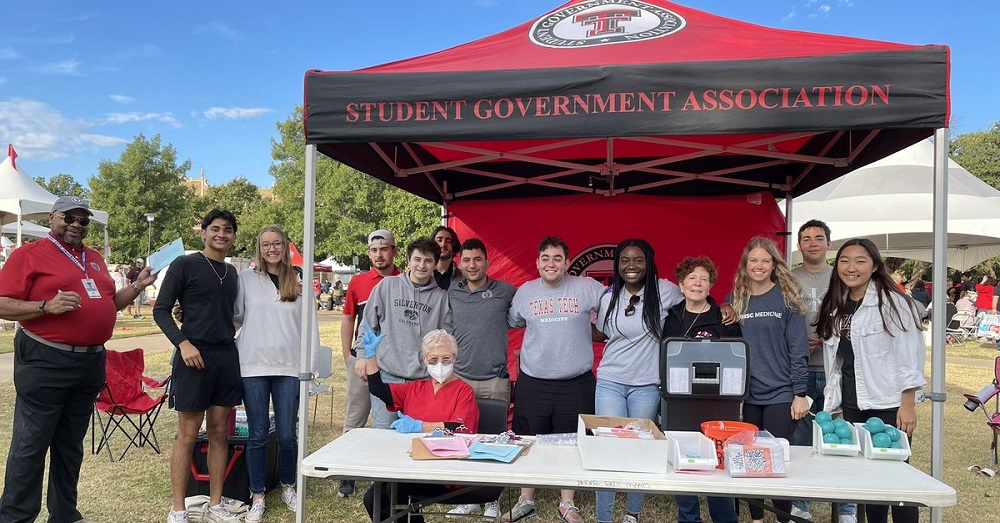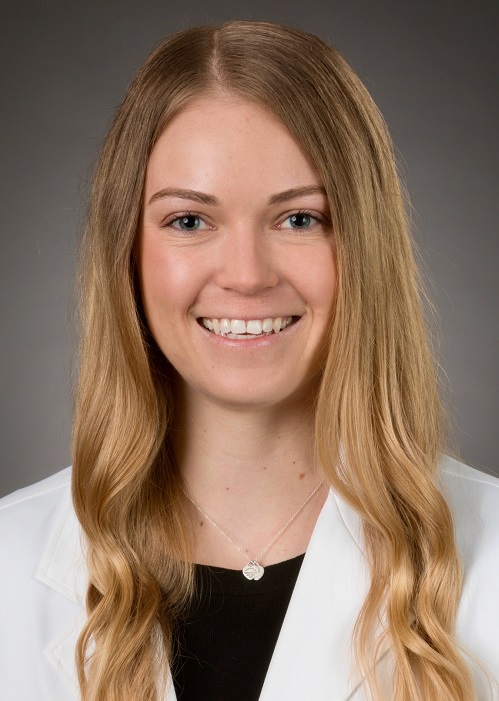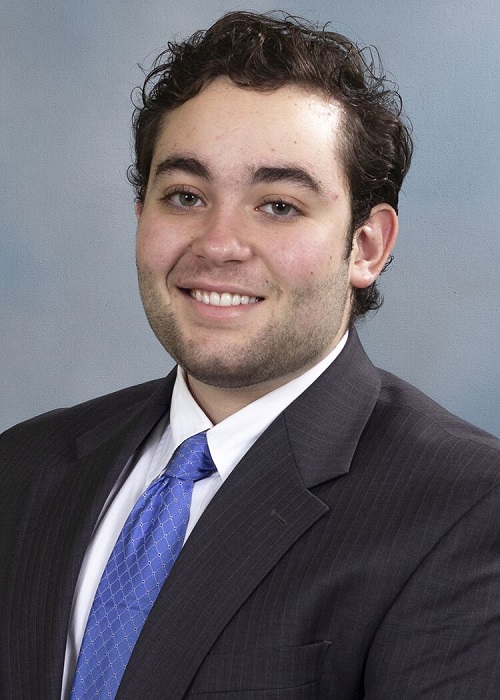TTU System Health Policy and Public Health Think Tank Hosted First West Texas Health Disparities Research Symposium

During the first year, more than 100 first- and second-year Lubbock medical students were trained to administer vaccines
When the inaugural West Texas Health Disparities Research Symposium commences April 27-28 at the Texas Tech University Health Sciences Center (TTUHSC) Academic Event Center, it will mark the largest event resulting from the work of the Texas Tech University (TTU) System Health Policy and Public Health Think Tank.
The symposium is seeking to bring together like-minded individuals who are committed to working toward health equity in the region. The event will feature distinguished national keynote speakers, panelists and interactive discussions with health care professionals from various institutions and disciplines across West Texas. Attendees will hear speakers seeking to identify health care disparities in West Texas, presentations of primary and secondary data related to those disparities and proposals for current or prospective interventions or strategies that can address those issues.
“As a university, our vision is to transform health care through innovation and collaboration,” TTUHSC President Lori Rice-Spearman said. “The innovative and collaborative nature of this symposium presents an exciting opportunity to identify critical health disparities and discuss solutions related to research, education and patient services that significantly impact health care, promoting health equity. To have our students initiating such an event truly represents why we are here — to educate future health care leaders whose approach to patient care is forward-thinking.”

Reagan Collins
For Reagan Collins and Jad Zeitouni, third-year medical students at the TTUHSC School of Medicine and co-founders of the TTU System Health Policy and Public Health Think Tank, the symposium is an opportunity to showcase some of the research and programs initiated by and through the think tank since its inception nearly two years ago.
Collins said the goal was to create a multidisciplinary and collaborative organization to promote health equity and access to care throughout the West Texas region. The idea for the think tank arose out of the COVID-19 pandemic when Collins and Zeitouni became involved with the West Texas 3D COVID-19 Relief Consortium, which provided personal protective equipment (PPE) for regional hospitals in the local area. Through that effort, they saw the value of collaboration.
“We saw the TTU Honors College and Engineering Department working with TTUHSC during COVID-19 and learned just what the multidisciplinary approach to health problems could really add to our communities,” Collins said. “We then had the idea to create an entity that promoted that collaboration across all of West Texas. We saw the TTU system as a perfect avenue to approach that idea because it already covers West Texas, so we were able to utilize the system to bring together faculty and students from across the region.”
Zeitouni said TTU System’s large coverage area also means there are significant educational resources and a diverse knowledge base to deal with issues that may vary from one community to another.
“It's nice to have an entity to get students and faculty together from this very large resource pool and collaborate on issues that we all face at the same time,” Zeitouni said. “We say this all the time, but the issues and challenges being faced in East Lubbock, for example, are going to be much different than the challenges in a rural town outside of El Paso. We're not just Texas Tech University, we’re not just TTUHSC; we're also Angelo State, Midwestern State and TTUHSC-El Paso, so the TTU System very nicely combines everyone together. It's supposed to be a collaborative effort to try to figure out some of these problems, research them and then hopefully implement solutions and advocate for change.”

Jad Zeitouni
To ensure all corners of the system are included, the TTU System Health Policy and Public Health Think Tank has a faculty board and a student board that meet each month. Both boards are comprised of representatives from all TTU System institutions. In the relatively short time since the group was established, Collins said this cross-campus collaboration already has produced positive results and promoted new kinds of initiatives to address unforeseen issues.
For instance, during the height of the COVID-19 pandemic, the TTUHSC-El Paso School of Medicine designed a program to train approximately 10-20 of their medical students to administer vaccinations. Though it was initially considered to be a small scale, one-time effort, it became much more when the members of the think tank’s faculty board mentioned the initiative in a monthly meeting.
At that meeting, Collins said one of the issues posed to the group was vaccines and vaccine hesitancy in Lubbock and that medical students are not traditionally trained to vaccinate. From those discussions, Lubbock think tank members took the initiative that El Paso had developed and collaborated with the TTUHSC School of Nursing to adapt it for their campus.
During the first year, more than 100 first- and second-year Lubbock medical students were trained to administer vaccines, and the program is now in its second year. The think tank also produced a study from the initiative (“Establishment of a vaccine administration training program for medical students”) in an effort to publicly share the curriculum so it may serve as a framework for other medical schools to launch a similar initiative for their students.
“From that, we have created a curriculum for the vaccine training program that now is going to go back to El Paso so they have a more formal program there,” Collins said. “I think that’s the real value of the think tank: to learn from our different communities because there are unique challenges that each are going to face. But we also, as part of West Texas, all have similar health disparity challenges, whether it be rural health or in our urban centers. So just providing an entity for us to share different ideas and learn from each other is, I think, the underlying goal of the think tank.”
Though they have successfully established the TTU System Health Policy and Public Health Think Tank, Collins and Zeitouni are still medical students who will likely leave Lubbock one day for residency training or to begin their careers as practitioners. So what will become of the think tank when its co-founders face new opportunities?
“I think we're both going to be involved in the think tank well after medical school,” Zeitouni said. “In terms of our roles as co-executive directors, it’s very clearly described in our bylaws, but the people that we want to take over for us in two or three years are working with us right now. They might be current undergrads at TTU, Midwestern State or Angelo State so by the time they start medical school or another graduate school at TTUHSC, or by the time Reagan and I leave they can take over and serve their terms as executive director or co-executive directors in terms of the board and prepare students behind them to do the same.”
Collins agreed and said the emergence of Zoom during the pandemic has provided a blue print for how she and Zeitouni can stay involved indefinitely. In fact, she’s spent the year working from Boston, so living away from Lubbock won’t prevent her from staying involved with the think tank.
“While we've been planning the symposium and working on different initiatives, I've been taking a year off from school for a research fellowship, so I haven't even been local,” Collins said. “But all of our student and faculty board meetings are held via Zoom, so I think that's part of the beauty of the think tank. We are able to collaborate and still bring our own unique perspectives wherever we may be. I think with Jad and I both being from Lubbock, our hearts are really in it; this is something that we're passionate about, and I think it's something that I perceive having some sort of involvement with, no matter where my career takes me.”
For more information about the West Texas Health Disparities Research Symposium, please visit www.ttuhsc.edu/medicine/academic-affairs/documents/ThinkTank_1stSymposiumTrifold.pdf
Related Stories
TTUHSC Cancer Researcher Honored by National Academy of Inventors
C. Patrick Reynolds, M.D., Ph.D., director of the School of Medicine Pediatric Cancer Research Center at TTUHSC, has dedicated his life as a researcher to developing treatments for childhood cancers.
TTUHSC’s Hudson Set to Serve as President for Society of Clinical Research Associates
The Society of Clinical Research Associates (SOCRA) has elected Texas Tech University Health Sciences Center’s (TTUHSC) Catherine Hudson, Dr.P.H., as its president for 2025-2026.
Clinical Research Institute a Source of Pride for Retiring Griswold
Upon his retirement, John Griswold, M.D., reflects on the Clinical Research Institute and what it has achieved.
Recent Stories
The John Wayne Cancer Foundation Surgical Oncology Fellowship Program at Texas Tech University Health Sciences Center Announced
TTUHSC is collaborating with the John Wayne Cancer Foundation and has established the Big Cure Endowment, which supports the university’s efforts to reduce cancer incidence and increase survivability of people in rural and underserved areas.
TTUHSC Receives $1 Million Gift from Amarillo National Bank to Expand and Enhance Pediatric Care in the Panhandle
TTUHSC School of Medicine leaders accepted a $1 million philanthropic gift from Amarillo National Bank on Tuesday (Feb. 10), marking a transformational investment in pediatric care for the Texas Panhandle.
Texas Tech University Health Sciences Center Permian Basin Announces Pediatric Residency Program Gift
TTUHSC Permian Basin, along with the Permian Strategic Partnership and the Scharbauer Foundation, Feb. 5 announced a gift that will fund a new pediatric residency.
